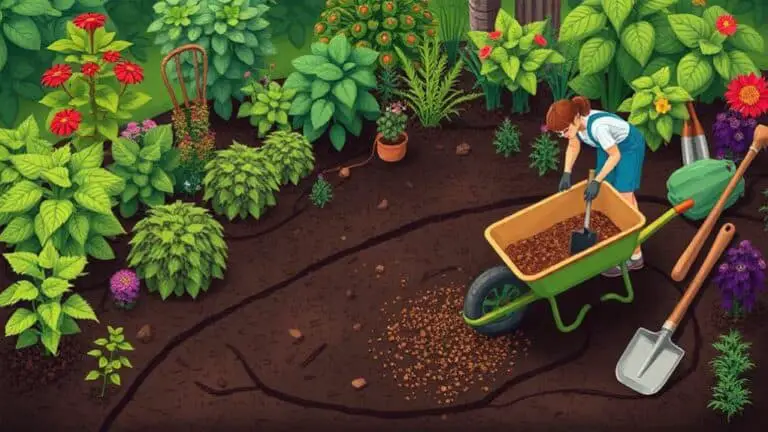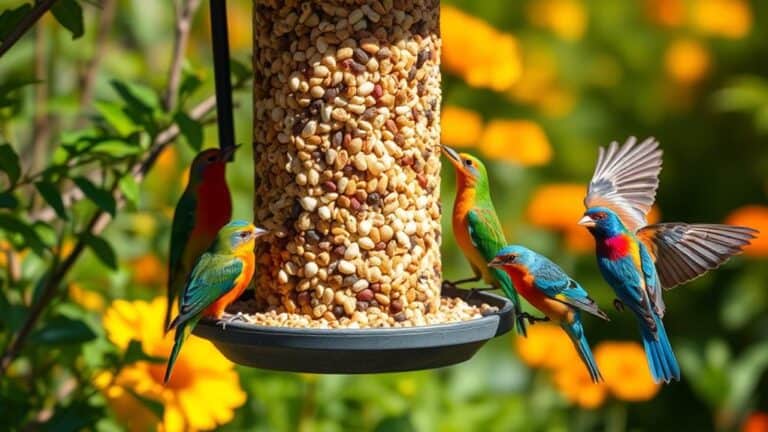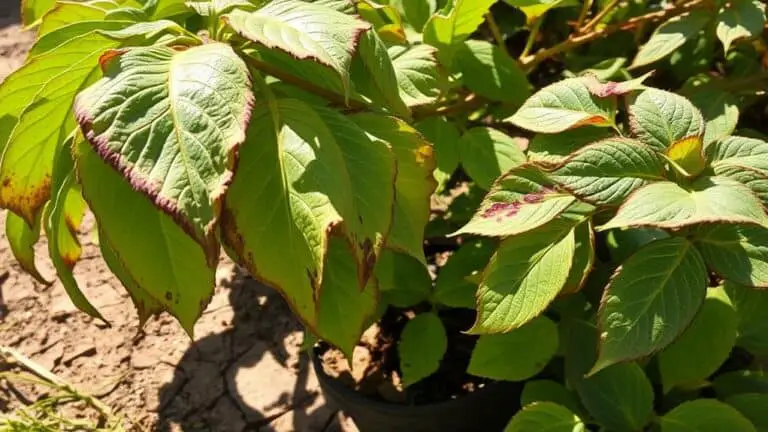Why Recycling Food Waste Is Better Than Throwing It Away
When I think about the food scraps we toss into the trash, I can't help but see the missed opportunities for making a positive impact. Recycling food waste isn't just about reducing landfill volume; it also cuts down on harmful methane emissions. By composting, we can turn food scraps into nutrient-rich soil, supporting sustainable agriculture and healthier gardens. And let's not forget the economic advantages, from conserving resources to fostering a circular economy. There's so much more to this topic that can benefit both the environment and our communities. Have you ever considered how much potential lies in those banana peels and coffee grounds?
Food Waste Statistics
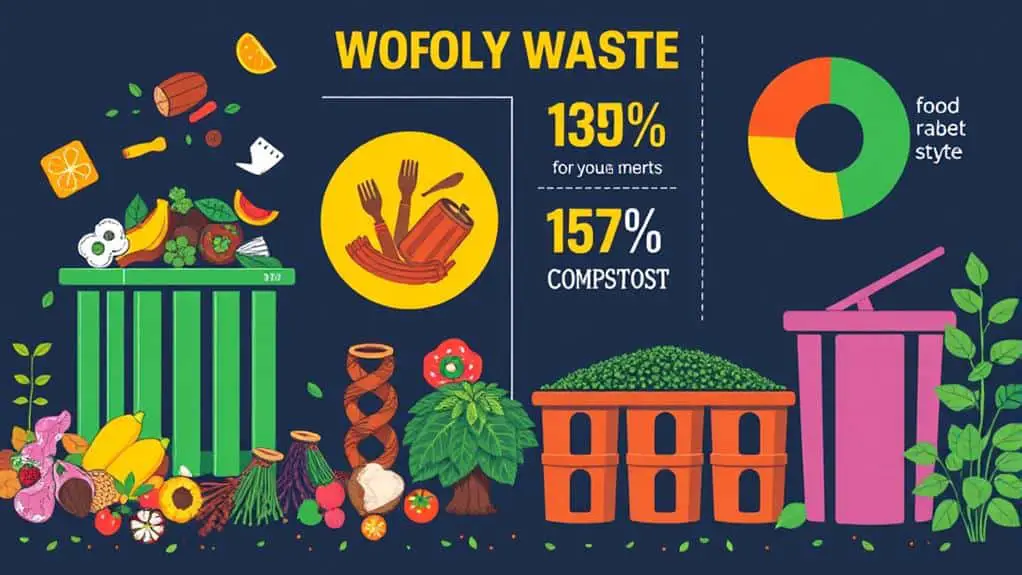
When we look at the sheer magnitude of food waste, the numbers are staggering. In the U.S. alone, nearly 60 million tons of food is wasted every year. That's about 40% of our entire food supply.
Think about what that means: we're losing around 130 billion meals annually. This contributes not just to food loss, but also to food insecurity for many families. The US Environmental Protection Agency highlights that reducing food waste could help tackle this issue.
Plus, food waste is responsible for 11% of global greenhouse gas emissions. That's like the emissions from 37 million cars!
Economic Impact
Understanding the staggering statistics of food waste sets the stage for realizing its profound economic impact. Did you know that food waste in the U.S. costs over $408 billion annually?
By recycling food waste, households can save about $370 per person each year. Composting not only cuts down on landfill contributions but also reduces disposal fees, leading to more savings.
Imagine an average family of four wasting $1,600 yearly on produce. That's a lot of money that could be saved!
Businesses also benefit economically by reducing food waste, often seeing positive returns and tax incentives for donating unsold food.
Environmental Benefits
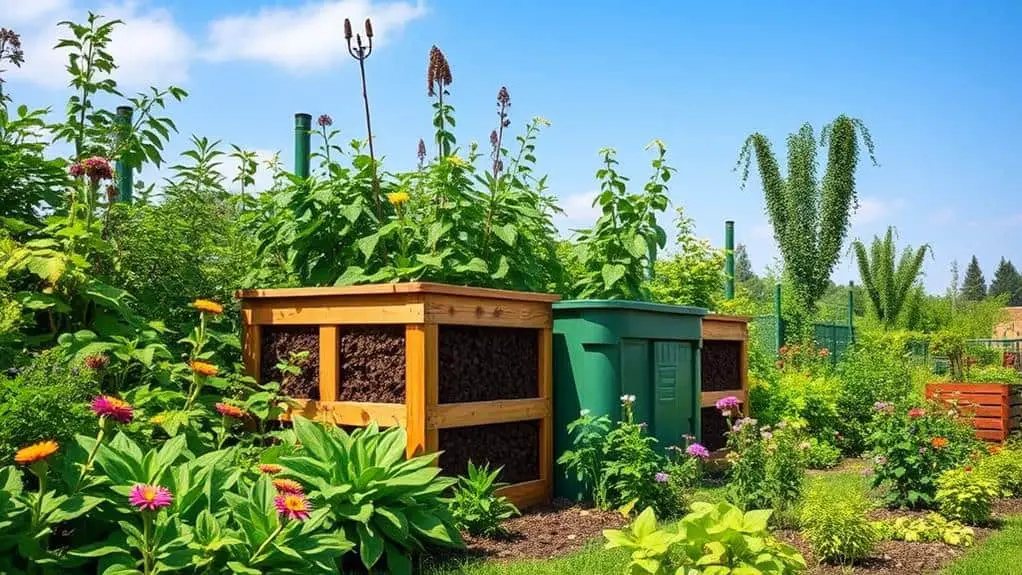
Recycling food waste offers tremendous environmental benefits that can't be overlooked. When we recycle food waste instead of tossing it, we reduce the amount of organic material sent to landfills.
Landfills are the largest category of municipal waste and contribute greatly to greenhouse gas emissions. By participating in composting programs, we enrich the soil and support local ecosystems, making our gardens and farms more productive.
Plus, recycling food waste can generate green energy or biofuel, powering our homes sustainably. This practice helps us lower our environmental footprint and promotes a circular economy.
Methane Reduction
Reducing methane emissions is another significant advantage of recycling food waste. When we throw food waste into landfills, it decomposes anaerobically and produces methane, a potent greenhouse gas.
Methane emissions from landfills account for about 14.1% of total methane emissions in the U.S., which contributes greatly to climate change. Composting, on the other hand, allows food waste to break down aerobically, producing negligible methane.
By composting our food waste, we can reduce these harmful methane emissions, lessening the environmental impact. In fact, diverting food waste from landfills to composting can be as impactful as taking millions of cars off the road.
Let's make a change and help achieve greenhouse gas reduction goals by composting our food waste.
Resource Conservation
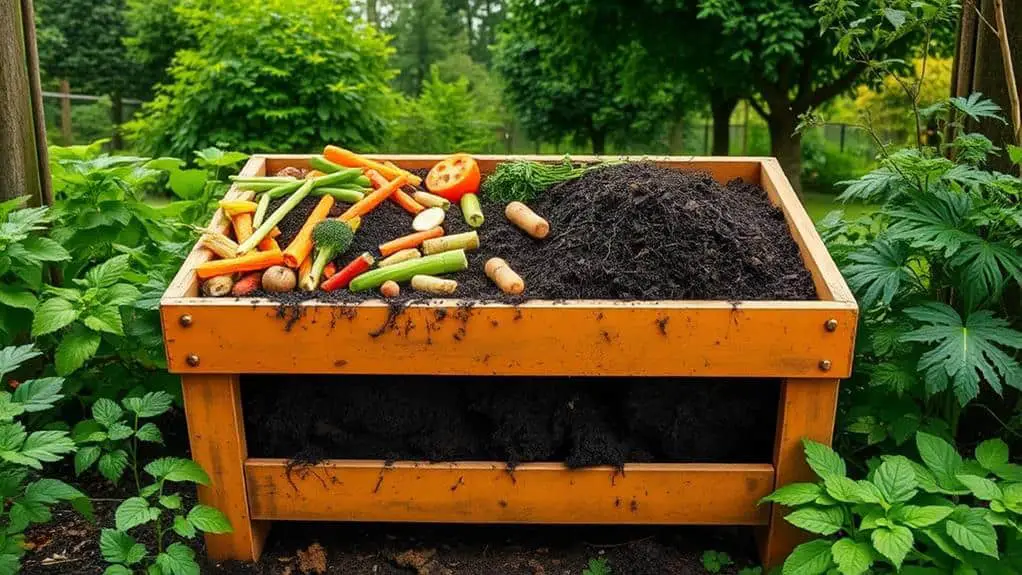
Recycling food waste helps us use resources more efficiently and reduces the negative impact on our environment.
By composting, we can improve soil quality, which means we won't need as many chemical fertilizers.
This practice supports sustainable food production and makes our supply chains more eco-friendly.
Efficient Resource Utilization
When we think about the resources that go into producing our food, it's staggering to realize that a significant portion of them ends up wasted. Recycling food waste is a great way to promote efficient resource use. By recycling, we conserve the land, water, labor, and energy used to produce our food. Did you know that about 25% of the world's freshwater grows food that's never eaten? Composting food waste improves soil quality, boosts fertility, and supports sustainable agricultural practices, reducing our need for chemical fertilizers. Plus, recycling food waste helps cut down on methane emissions, a big contributor to climate change.
Here's a quick look at the benefits:
| Benefit | Impact |
|---|---|
| Conserves Land | Less wasted space |
| Saves Water | 25% of freshwater preserved |
| Reduces Labor & Energy | More efficient supply chains |
| Lowers Methane Emissions | Decreases climate change |
Reducing Environmental Impact
Understanding how efficiently we can use our resources naturally leads us to contemplate the broader environmental impacts of our actions.
Recycling food waste is a key step in reducing environmental impact. When we compost food waste, we conserve resources like water and land.
Also, composting helps reduce greenhouse gas emissions because it prevents methane emissions from landfills.
- Conserves water: 25% of the world's freshwater is used to grow food that isn't eaten.
- Reduces greenhouse gases: 1.1 tons of CO₂ equivalent emissions can be avoided per ton of composted food waste.
- Prevents methane emissions: Methane is 25 times more potent than CO₂.
- Saves energy and resources: Discarded food wastes significant energy and labor.
- Promotes better resource use: Composting helps use resources more efficiently.
Enhancing Soil Quality
Nutrient enrichment is one of the most compelling benefits of composting food waste. When you compost food scraps, you're adding essential nutrients and organic matter back into the soil. This boosts soil quality and supports healthier plant growth.
Composting improves soil structure, making it better at retaining moisture. This means you won't need as many chemical fertilizers. Plus, compost introduces beneficial microorganisms that help break down organic material.
Using food scraps for composting also reduces waste in landfills, which helps lower greenhouse gas emissions. When you incorporate compost into your garden, you'll likely see increased crop yields.
The nutrients and organic matter create a resilient ecosystem, making your plants stronger and more productive.
Consumer Behavior
Consumer behavior plays an essential role in food waste, and it's evident that a majority of Americans misunderstand expiration labels. This misunderstanding leads to unnecessary food waste.
Did you know that about two-thirds of home food waste happens because of spoilage before use? Here are some tips to help reduce waste:
- Meal planning: Plan your meals to buy only what you need.
- Proper storage: Store food correctly to extend its shelf life.
- Public awareness: Learn about the difference between "sell by" and "use by" dates.
- Reduce spoilage: Avoid impulsive purchases that lead to excess food.
- Use leftovers: Get creative with leftovers to avoid throwing them out.
Government Initiatives
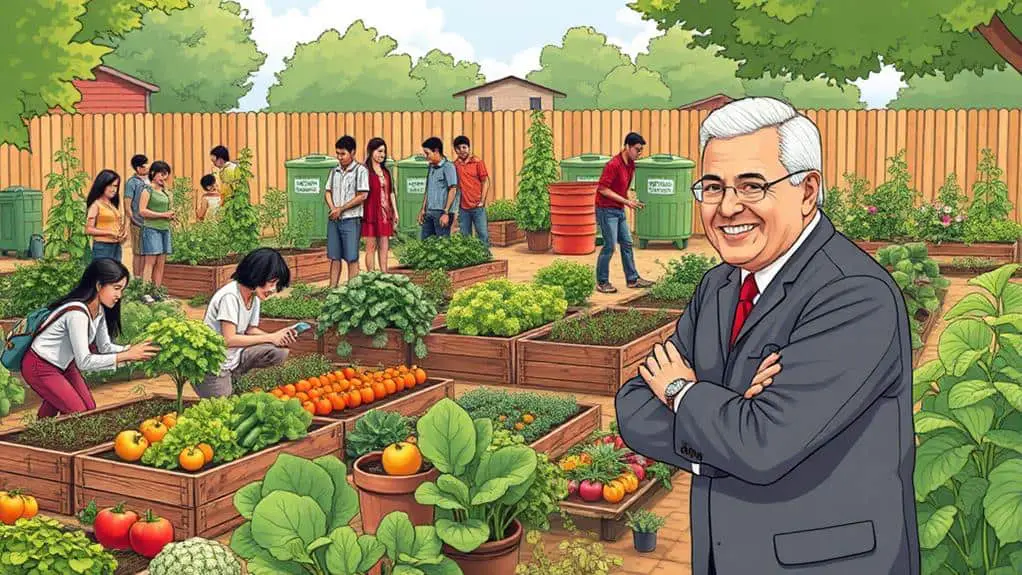
In recent years, government initiatives to tackle food waste have ramped up considerably, and they're making a big difference.
States like California and Vermont are leading the way with laws to reduce food waste. Vermont's Universal Recycling Law even bans food scrap waste.
New York City aims to divert 100,000 tons of food from landfills each year through composting and food recovery programs.
The USDA and EPA have set a national goal to halve food waste by 2030.
Schools in Maine and Rhode Island are adopting food waste reduction legislation, showing a commitment to sustainability.
These government initiatives often include education campaigns to help us better understand expiration labels and promote composting practices.
Composting Advantages
While tackling food waste might seem challenging, composting offers a straightforward and impactful solution. By composting, you can turn food waste into valuable nutrients that enrich soil and promote healthier plant growth.
You'll also help reduce landfill waste and methane emissions, which greatly lowers the environmental impact. Home composting is practical, even in small spaces, and can save money on fertilizers.
- Enriches soil quality by returning nutrients to the earth
- Diverts up to 30% of household waste from landfills
- Reduces methane emissions, a potent greenhouse gas
- Supports urban households in waste reduction efforts
- Saves money on gardening and landscaping supplies
Composting is a simple yet powerful way to make a positive change.
Food Donation
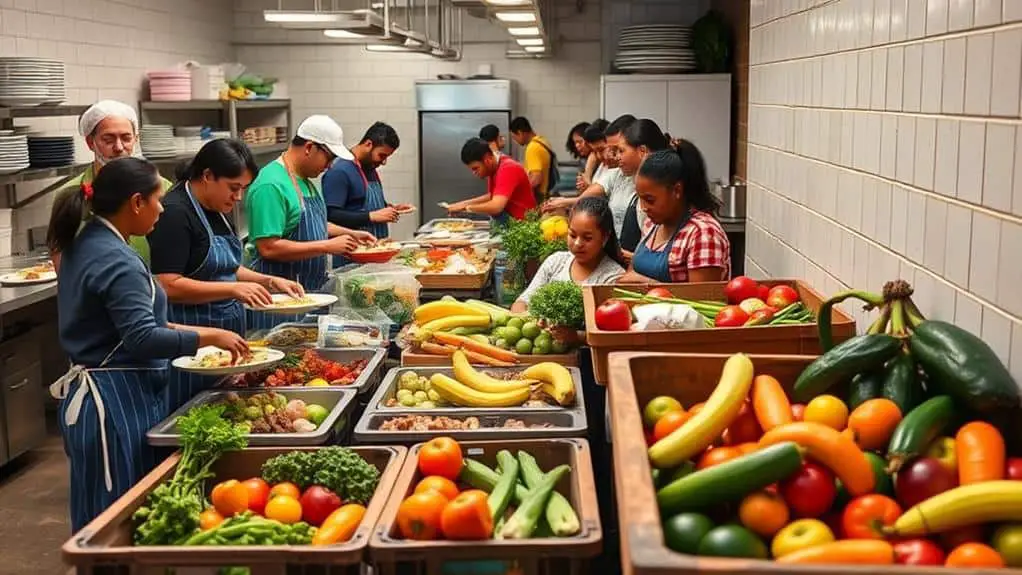
Food donation serves as an efficient and compassionate approach to tackling both food waste and hunger simultaneously. By donating surplus food, we can reduce food loss and help feed those in need.
Organizations like Feeding America rescue about 3.6 billion pounds of food each year, proving the significant impact of food donation. However, we're only rescuing a small fraction of the available surplus, meaning there's still a lot more we can do.
When businesses donate unsold but safe food, they not only help alleviate hunger but can also benefit from tax incentives.
Food banks play an essential role by redistributing surplus food to families facing food scarcity.
Let's make food donation a priority to reduce food waste and support our communities.
Community Impact
When we recycle food waste, we can reduce the amount sent to landfills, cutting down on harmful methane gas emissions.
This not only helps the environment but also supports local food banks by redirecting edible food to those in need.
Reducing Landfill Contributions
Every time we throw away food, we're contributing to a significant environmental issue. Food waste makes up about 22% of municipal solid waste in US landfills.
When it decomposes, it releases methane, a powerful greenhouse gas. Methane from landfills accounts for about 14.1% of total methane emissions in the US.
Instead of contributing to this problem, we can recycle food waste by composting. This simple act can:
- Reduce the volume of waste in landfills
- Lower greenhouse gas emissions
- Enhance soil health
- Support local agriculture
- Reduce the need for chemical fertilizers
Supporting Local Food Banks
Local food banks are a powerful ally in the fight against food insecurity and waste. By supporting local food banks, we help redistribute surplus food to those who need it most.
Organizations like Feeding America rescue about 3.6 billion pounds of food annually, addressing food insecurity for millions. Donating food not only aids hungry individuals but also reduces food waste and greenhouse gas emissions.
Many food banks operate with limited resources, so every donation makes a big difference. When we engage in donating food, we foster community involvement and raise awareness about food waste.
Let's work together to support local food banks and guarantee safe, nutritious food reaches those facing food insecurity, strengthening our communities.
Frequently Asked Questions
Why Is Recycling Better Than Throwing Away?
Recycling food waste through composting reduces landfill use and environmental impact. It enhances nutrient cycling, saves costs, and involves the community in sustainable practices. Composting supports soil health and aligns with achieving our sustainability goals.
Why Is Recycling Food Waste Good?
Recycling food waste is great because it offers composting benefits, enriches soil, and reduces greenhouse emissions. It promotes sustainable practices, boosts community engagement, and guarantees efficient resource recovery, all while minimizing our environmental impact.
Why Is It Bad to Throw Away Food Waste?
Throwing away food waste exacerbates landfill issues and methane emissions, leading to severe environmental impact. Nutrient loss occurs when food isn't composted. Composting benefits include reducing methane and promoting sustainable practices. Let's adopt sustainable practices to mitigate these issues.
What Are the 5 Benefits of Recycling?
Recycling food waste has great benefits: it reduces landfill waste and methane emissions, enriches soil through nutrient cycling, supports composting benefits, promotes sustainable practices, and enhances community gardening efforts. It's a win for everyone!
Conclusion
Recycling food waste is a simple way to make a big difference. By composting and donating excess food, we help our environment, save resources, and support our communities. Imagine turning kitchen scraps into rich soil for your garden—it's rewarding and sustainable. Plus, reducing methane from landfills helps fight climate change. So, let's all take small steps together to recycle food waste. You'll feel good knowing you're contributing to a healthier planet and community.



